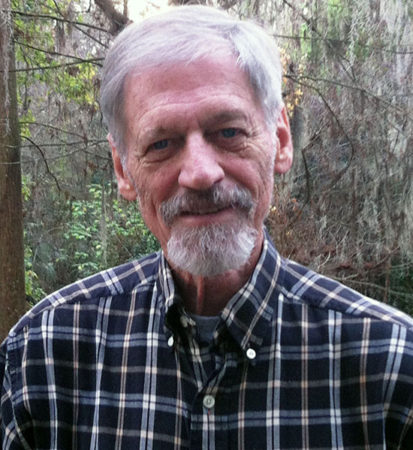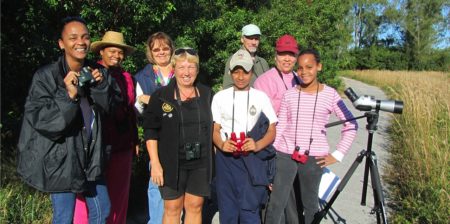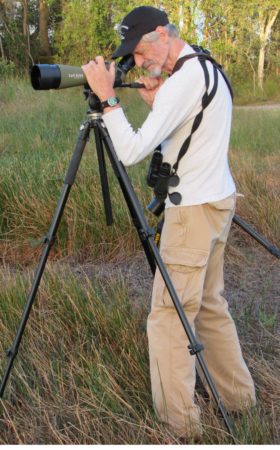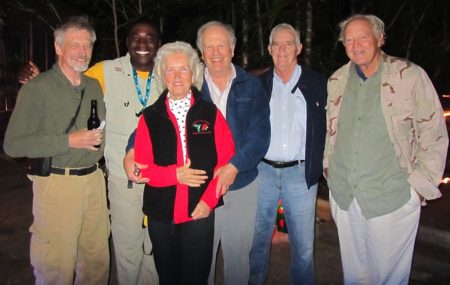
The BirdsCaribbean community mourns the loss of a friend, colleague and mentor – Dr. Robert Leslie Norton, affectionately known as ‘Rob’. A true champion for Caribbean birds, Rob was at the forefront of several regional initiatives to study, monitor and advocate for the preservation of birds and their habitats – including the creation of the Society for the Conservation and Study of Caribbean Birds, now BirdsCaribbean.
We extend deepest condolences to his wife, Sheryl, his family, and his many colleagues, friends and students across the globe.
Rob’s career, spanning five decades and several countries, always centered on a common goal – environmental research and education, specifically the conservation of birds – his true north.
Rob was born in Australia, during wartime, in June of 1945, to Shirley J. Nicholls Norton and Army 1st Lt. Robert L. Norton. The family arrived in the United States in 1946, and from 1948 to 1951 called Officer’s Quarters #57 at Ft. Williams in Cape Elizabeth, Maine, home. Here, Rob lived with his mom and dad; brothers, Philip and Scott; and little sister, Tery.
As a child, growing up in Cape Elizabeth, Rob would often explore the countryside near Sunset Park and in Scarborough. He developed a fascination with nature and birdwatching, which would lead to the creation of his first “Science and Nature Club” – with a handful of neighborhood boys as members.
After graduating in 1964, he successfully pursued a degree in geography at the Central Connecticut State College (CCSC) and, while there, enlisted into the Air Force. Rob’s affinity for physical science saw him undertake weather observations with the Air force for the next five years in Massachusetts. It was here that his passion for birdwatching grew to new heights.

Rob worked part time at the University of Connecticut, with the Connecticut State Climate Center, researching past weather events. He enrolled in biology classes while working there and ornithology was a part of his studies. His interests eventually led him to an internship at Manomet Bird Observatory, near Cape Cod. These experiences laid the groundwork for Rob’s destined path towards environmental research and impact studies.

An invitation from a University of Connecticut friend to visit the U.S. Virgin Islands (USVI) would prove to be life changing for Rob. Enthralled by the rich flora and fauna of the tropical island, Rob would make it his home for the better part of the next decade. Here, he worked as a seabird researcher for the USVI government for seven years; met the love of his life and wife-to-be, Sheryl; and adopted his beautiful and talented daughter, Whitney. During his time in St. John, USVI, Rob was also part owner of a small newspaper, “Tradewinds”; and he was hired as the second director of the British Virgin Island’s National Parks Trust (a non-profit, protecting natural and cultural heritage). His time in the USVI, and his visits to the surrounding islands, cemented an everlasting connection to the people and the culture in this remarkable part of the world.
Rob would return to the U.S. in 1990 to be closer to his mother Shirley. Always learning, he enrolled at Goddard College and earned an MA in biogeography, then to Columbia Pacific University for his PhD in environmental science.
In April of 1991, Rob and Sheryl married, settled in Gainesville and added “his handsome boy”, Alex, to the family. In 1992, Rob spent the year with the Smithsonian’s Natural History and Ornithology Department in Washington, D.C. Next he moved to Gainesville, Florida, where he taught science courses at Santa Fe College and worked with Alachua County government as an environmental specialist and planner until his retirement in 2008.
When most people would be taking things a little easier in retirement, Rob decided to train and compete in the World Senior Track and Field Games in Australia – a nod to his track and field and Key Club days at South Portland High School, which he enjoyed tremendously. Shortly after this, Rob overcame another challenge – wrestling and beating cancer. He persevered and continued his birding adventures with his family and friends, even renewing his and Sheryl’s wedding vows with a pelagic birding cruise on The Wanderbird out of Belfast, Maine.
Rest in peace, dear Rob. Your kind-hearted spirit, dedication and contributions to the shared knowledge of Caribbean birds will forever remain in our hearts and fuel our efforts to continue protecting birds and their habitats.

Biography

Dr. Robert L. Norton (Rob) was a prominent ornithologist and natural history guide throughout the Caribbean. He had vast knowledge of the region’s birds and the threats they face and was a generous mentor to many young people.
Rob was the originator and co-editor of the West Indies regional report in American Birds, Field Notes, and North American Birds (American Birding Association) since 1980. He contributed to many publications and will be particularly remembered for An Inventory of Breeding Seabirds of the Caribbean (2009) which he co-edited with Patricia Bradley. He initiated multiple Christmas Bird Counts in western Cuba and thoroughly enjoyed his time with Holbrook Travel as a Road Scholar’s guide.
Rob was among the founding members of BirdsCaribbean (then called the Society for the Conservation and Study of Caribbean Birds) and delighted in attending the organization’s conferences and assisting with various conservation projects, especially those encouraging capacity building for bird research, monitoring and education of youth and local communities.
Dr. Lisa Sorenson, BirdsCaribbean Executive Director, reflected on Rob’s impact on the organization over the years through his passion and genuine desire to share, educate and mentor.
“Rob cared passionately about the region’s birds and was concerned about threats to their long-term survival. He worked hard and volunteered his time to educate the public and mentor our members – helping to build the capacity of the region’s biologists,” Lisa shared. “I will always remember Rob as a kind, generous, and gentle soul, always engaged and willing to lend a hand to whomever needed help. I just wish we had more time with Rob, but we will treasure the memories that we have, and always be inspired by his commitment and hard work to understand and protect the Caribbean’s invaluable birds.”
If you would like to make a donation in Rob’s memory, Rob’s wife Sheryl has asked that donations be made to BirdsCaribbean at this link: http://bit.ly/GiftForCaribbeanBirds
Sheryl asks that you designate this donation for, “Reducing bird trapping and killing,” to help us in our work to safeguard birds from illegal trafficking – a cause that was dear to Rob’s heart.
Learn more about this issue here.
Donations by check can be sent to: BirdsCaribbean
Check memo: In Rob Norton’s memory.
Address: BirdsCaribbean
841 Worcester St. #130
Natick, MA 01760
Tributes
Rob was well respected by a large network of friends and colleagues, many of whom wished to provide their own memories. These recollections paint a picture of an individual who cared deeply about the environment and its bird life and his encouragement for others in their endeavours.
Andrew Dobson:
Rob had been single-handedly producing seasonal bird reports for the West Indies in North American Birds for over 20 years when the late Tony White and I were invited to become co-editors. This was 2002 and we expanded the coverage to include Bermuda. What a privilege it was to be part of the team with Rob as such a knowledgeable captain. I look back on the hundreds of emails we exchanged and the professionalism he demonstrated. He was responsible for making sure regional bird records over the past 40 years were documented. What a great legacy. I will miss his sage advice but above all, his friendship.
Natasha Atkins:
Back in 1975, when I was an intern at the then Manomet Bird Observatory, I took a canoe trip with Rob and another Manomet friend of his out to Monomoy National Wildlife Refuge, off Chatham on Cape Cod. It was a pretty long trip, 3 or 4 miles, and the guys did all the paddling. We spent the day watching shorebirds/waders, and as we headed back to the canoe for the return trip, a gull dropped a hot dog right in front of us, which was hilarious. By the time we got back in the boat, the wind had picked up pretty strongly, and we were already riding about 4 inches above the surface with two big guys and me in the canoe. It was a bit of a hair-raising trip back, but Frank’s and Rob’s good humor kept me from getting too panicky. It’s the only time I spent with Rob, but 45 years later it’s still a wonderful memory.
Patricia E. Bradley:
I send my condolences to Sheryl and Rob’s family and join his many friends lamenting the loss of this wonderful, dedicated and courageous man. We go back to the early 1980s when I began sending records from the Cayman Islands and we began a friendship, extended at our first meeting in Jamaica in 1985, that continued. Our last meeting was when Rob and Sheryl visited Grand Cayman and I took him to see our Vitelline Warbler. The Inventory of Caribbean Seabirds published in 2009 was our response to the increasing threats and population declines throughout the region and it leant on the work of Schreiber and Lee 2000 and van Halewyn and Norton 1984. It was a challenge to find and persuade seabird specialists to produce a chapter on their Caribbean island and share their inventory. It was also great fun as we worked with English, Dutch, French and Spanish authors for what seemed like years, and using Rob’s exhaustive understanding of the regions’ birds. The GIS analysis and maps by William Mackin were an essential part of the publication. It was also a time when Rob was dealing with cancer surgery and my husband was in the final stage of cancer and so the project kept us focused.
Jaime Collazo:
I met Rob when he worked at the Division of Fish & Wildlife, USVI. He provided much needed support for my research at that time, and during the mid-80s, we advocated for conservation of avifauna in the US Caribbean in various forums. I always appreciated Rob’s “never give up” attitude. He will be missed! My condolences to his family.
Natalia Collier:
Robert was a mentor to Adam and me as we began working in the Caribbean, providing helpful advice and perspective. He was always ready to answer questions thoughtfully and kindly. His 2009 inventory is dog-eared and worn after countless references as we worked on the Seabird Breeding Atlas of the Lesser Antilles and other seabird-related manuscripts. I’m sure there are many others who were also influenced by his research and generous nature and his legacy will carry on in his work and those he helped along their paths. My sincere condolences to his family and friends.
Daphne Gemmill:
I only met Rob once or twice many years ago. However, we corresponded frequently regarding Vieques and Puerto Rican birds. His input was invaluable. He was on my unofficial Vieques rare birds committee. He will be missed.
Scott Johnson:
My fondest memory of Robert Norton was in 2017, when I was working at the Bahamas National Trust (BNT) and participated in the “Expedition Parks242” field trip on Andros. I was taking some of the participants birding, in North/central Andros. Robert, an avid birder and researcher, was interested in seeing a Bahama Oriole, one of our endemic birds and a critically endangered species. We visited a few locations with no luck. I honestly thought my skills as a birder and guide were going to be dashed in the Andros pinelands as we visited more locations and still did not find the bird. Finally, I took him and Vivian Moultrie, an Inagua Bird guide and one of the persons responsible for creating the motto on our Coat of Arms, to a place called “The Atala Forest”. This site was filled with Atala Hairstreaks, in the hundreds. As we walked through the forest, low and behold, a Bahama Oriole made an appearance, a lifer bird for Robert. Rest in Peace Robert. I wish I had spent more time talking with you and always appreciated your witty comments on my fb posts. You will be missed my friend.
Anthony Levesque:
I met Rob for the first time in 2011 in the Bahamas during a BirdsCaribbean meeting. He was with Andrew Dobson and Eddie Massiah and two years later I replaced Eddie to be part of the West Indies and Bermuda Team for North American Birds magazine with the encouragement and benevolence of Rob. For years and years, Rob was the number one birder in the Caribbean (with nearly 450 species) and when I passed him, he immediately sent me a message of congratulations. A great loss to the Caribbean birding community.
Fred Schaffner:
I have known Rob for over 37 years and was deeply saddened by his passing. We first shared some great adventures on a number of trips in a small motorboat travelling between Culebra, Red Hook, and Little Tobago in the early 1980’s to make observations of seabirds with my doctoral mentor Colin Pennycuick (deceased) and John Taylor (also deceased), resulting in a number of reports and a small publication on the expansion of Cayenne Terns on the Puerto Rico Bank. Rob was a wonderful, cheerful person, a great friend, fully dedicated to bird conservation, and a founding member of what now is Birds Caribbean. I will be forever grateful for having had his friendship and I mourn his loss.
Ann Sutton:
Please share my condolences for this sad loss to Caribbean ornithology. Rob was an inspiration to me; especially because of his contributions to our knowledge of Caribbean seabirds.
Joseph M. Wunderle, Jr:
I was saddened to hear of Rob’s passing, as he has made major contributions to our understanding of avian distribution and natural history in the Caribbean. Although his numerous contributions will live on, he will be missed by many. Pass on my sincerest sympathies and condolences to his family.
NOTE: If you have stories, memories, a tribute, and/or photos of Rob you would like to include in this tribute article, please send them to: Tahira Carter, BirdsCaribbean Communications Manager Tahira.Carter@BirdsCaribbean.org
